|
|
|
Sort Order |
|
|
|
Items / Page
|
|
|
|
|
|
|
| Srl | Item |
| 1 |
ID:
170634
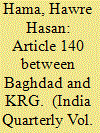

|
|
|
|
|
| Summary/Abstract |
The Iraqi state and the Kurds have always been at the odds over the territory around Kirkuk, particularly following the discovery of oil in the province in 1927. Both sides have claimed ownership of the province since that time and have sought to gain advantage over the other through various means. The region was subjected to a forced demographic change under the Arabisation policy during the reign of Ba’ath Party between 1968 and 2003. Following the overthrow of Saddam’s regime in 2003, the status of Kirkuk was to be constitutionally and peacefully resolved according to Article 58 of the 2004 interim constitution and then Article 140 of the 2005 permanent constitutions, which called for normalisation, a census, and a referendum in Kirkuk and other disputed areas to determine the will of their residents. Practically, however, various Iraqi governments and the two dominant Kurdish parties, the Patriotic Union of Kurdistan and the Kurdistan Democratic Party, were able to politicise implementation of Article 140. Although each blame the other, all share responsibility for the lack of implementation. This research investigates that experience and argues that the joint administration is the optimal scenario in the short run and independent region within the Iraqi state would be the best-case scenario in the long term.
|
|
|
|
|
|
|
|
|
|
|
|
|
|
|
|
| 2 |
ID:
179797


|
|
|
|
|
| Summary/Abstract |
The Kurdish armed forces and security forces, known as the Peshmerga and Asayish, respectively, have both been intensively politicized by the Kurdistan Democratic Party and the Patriotic Union of Kurdistan from their foundation to the present. The Kurdistan Regional Government (KRG) has already experienced serious systematic crises caused by weak democratic institutions, poor governance, and a dysfunctional party system. The failure to build cohesive armed forces in the Kurdistan Region of Iraq exacerbates these issues because it politicizes basic internal and external security. This article, based on interviews with the Kurdish authorities, discusses the ramifications of the KRG’s politicized forces on the democratic process, civil-military relations, the defence readiness of the Kurdish armed forces, societal instability, and judicial power. This research argues that Kurdish politicized forces severely affect the democratic process in the Kurdistan Region, create problems for civil-military relations, undermine defence readiness, cause instability, and also have a considerable, negative impact on judicial power.
|
|
|
|
|
|
|
|
|
|
|
|
|
|
|
|
| 3 |
ID:
168245
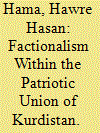

|
|
|
|
|
| Summary/Abstract |
Institutional conflicts within the Patriotic Union of Kurdistan (PUK) have existed ever since the party’s founding in 1975 as a result of a merger of three different factions. The conflicts were successfully managed in a way that did not hurt the party’s overall functioning until the Gorran movement, led by Nawshirwan Mustafa, split off in 2009. However, it was the withdrawal of party leader Jalal Talabani from political and public life due to a stroke suffered in 2012 that most damaged the party’s ability to function, and widened factional cracks within the organization. The absence of Talabani led to the emergence of intense competition between various groups within the PUK for influence and positions. Consequently, PUK policies on a number of important issues in Iraqi Kurdistan have been indecisive and weak since approximately 2013. This research will discuss the PUK’s inconsistent policies and their negative implications for the Kurdistan Region. Furthermore, it will argue that the PUK’s internal conflicts emboldened its rival, the Kurdistan Democratic Party, between the years 2014 and 2018.
|
|
|
|
|
|
|
|
|
|
|
|
|
|
|
|
| 4 |
ID:
166770


|
|
|
|
|
| Summary/Abstract |
In the early morning of 3 August 2014, Islamic State of Iraq and Syria (ISIS) attacked the Sinjar district in the vicinity of Mosul. The area was largely under the control of Kurdish forces at the time, especially those associated with the Kurdistan Democratic Party (KDP). Those forces could not defend the district and ISIS was able to take control of the area. Consequently, a considerable number of Yazidi people were killed or displaced, while female Yazidis were raped and kidnapped. This study, based on framing theory, attempts to explain how two major Kurdish media organizations, Rudaw, which is loyal to KDP, and the Kurdish News Network (KNN), which is loyal to the Gorran (Change) Movement, each covered the event in their news reports. By performing a content analysis of 222 news stories covering the event, the key finding of the research is that, in instances of assigning responsibility for the fall of Sinjar, political considerations are the determining factor in how the narrative was framed. Taken as part of a growing literature on media in Kurdistan, the research outlined in this article supports the conclusion that the framing of media coverage in the Kurdistan Region is subject to strong political bias and media organizations support the political narratives advanced by their political patrons, as it is the case in many other Middle Eastern countries.
|
|
|
|
|
|
|
|
|
|
|
|
|
|
|
|
| 5 |
ID:
171874
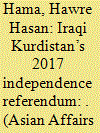

|
|
|
|
|
| Summary/Abstract |
On 7 June 2017, the former Kurdistan president Massoud Barzani called a meeting between 15 Kurdish political parties to seek their approval for a referendum on Iraqi Kurdish independence. Despite many adverse circumstances – the proroguing of the Kurdistan parliament, the strained relations among the Kurdish political parties, and the general political stalemate in Iraqi Kurdistan – the meeting agreed that a referendum should take place on 25 September 2017. However, both the Gorran Movement (Gorran) and the Kurdistan Islamic Group (Komal) refused to take part in the meeting and instead requested that the government's main focus be on restoring the political environment and restarting the Kurdistan parliament before any discussions take place on the issue of a Kurdish referendum. Notwithstanding internal, regional and international pressures, the Kurdistan Regional Government pressed ahead and held its referendum on 25 September 2017. The central question that remains about the Kurdistan referendum is what really motivated Kurdish politicians, in particular those of the Kurdistan Democratic Party (KDP) to hold the poll? This article argues that the KDP has a number of different public and private motivations in holding the independence referendum, which need to be explored.
|
|
|
|
|
|
|
|
|
|
|
|
|
|
|
|
| 6 |
ID:
174245


|
|
|
| 7 |
ID:
189939
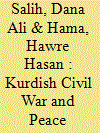

|
|
|
|
|
| Summary/Abstract |
The Kurdish Civil War between the military forces of the Kurdistan Democratic Party (KDP) and the Patriotic Union of Kurdistan (PUK) began in 1994. Despite frequently occurring peace talks throughout the conflict, negotiations failed to bring about a durable settlement until the United States brokered the Washington Peace Agreement in 1998. This research explores why the earlier negotiations were unsuccessful, and whether it was only the US mediation in 1998 which made the difference. Although the US mediation was clearly an important factor, by employing the contingency model this research argues that both contextual variables and process variables determined the success of negotiations in 1998. Furthermore, they can explain the failure of the previous 4 years of negotiations.
|
|
|
|
|
|
|
|
|
|
|
|
|
|
|
|
| 8 |
ID:
175135


|
|
|
|
|
| Summary/Abstract |
Ethnic and religious minorities have played a significant role in the long history of Kurdistan. At an official level, their political position was significantly strengthened with the advent of autonomy for the Kurdistan Region in northern Iraq in 1992. Most importantly, a quota system was established that reserved seats for several minority groups in the Kurdistan Parliament, often cited as an example of tolerance for diversity and respect for minority rights. Nevertheless, there is a lack of empirical research examining how ethnic and religious quotas affect democratic stability, quality of representation, and opportunities to represent authentic interests within the Kurdistan Regional Government (KRG). The politicians who occupy the reserved seats have come under criticism for merely supporting the policy programs of the dominant Kurdish parties, which deprives ethnic and religious minority groups of authentic representation and exposes the minority parties to allegations that they are politically exploited. This article analyzes the dynamics of minority political participation in Iraqi Kurdistan, how representation has been affected by the dominance of the ruling parties, and factors that guide the behavior of minority politicians while serving in quota-allocated positions. It also examines the effects of reserving seats through the quota system on the political behavior of minority groups. To these ends, this article focuses on parliamentary quotas and their impact on democratic stability, decision-making, and the empowerment of minority groups in the Kurdistan Region.
|
|
|
|
|
|
|
|
|
|
|
|
|
|
|
|
| 9 |
ID:
183731


|
|
|
|
|
| Summary/Abstract |
This article analyzes the Kurdish question in the Middle East from the English School perspective in international relations. The central argument is that the international community consistently deals with the Kurdish question through the principle of order rather than justice. It has respected the sovereignty of those nation-states hosting the Kurds rather than protecting the Kurdish population from grave human rights violations. Consequently, the Kurds have failed to achieve a semblance of autonomy, let alone independence. However, I argue that while the implementation of the no-fly-zone over northern Iraq in 1991 by the international community is a case for justice, it is not necessarily a case against the principle of order. In other words, the international community only dealt with the Kurdish issue using the principle of justice when implementing the 1991 no-fly-zone—but, notably, this was not against the principle of order.
|
|
|
|
|
|
|
|
|
|
|
|
|
|
|
|
| 10 |
ID:
158828


|
|
|
| 11 |
ID:
178380


|
|
|
|
|
| Summary/Abstract |
The Kurdistan Region of Iraq has a multi-party system which has been held up as a model for democratic pluralism in the whole region. The nature of Kurdistan’s political parties is strongly related to the position of Kurds in Iraq. From the mid-twentieth century, the dominant Kurdish political party in Iraq was the Kurdistan Democratic Party; in a later partisan split the Patriotic Union of Kurdistan was born. Moreover, in the last three decades other political parties have come into being, which have all influenced the characteristics of Iraqi Kurdistan’s political system. This paper’s main argument is that Iraqi Kurdistan shares many of the characteristics of its main political parties, including reliance on charismatic leadership, a focus on nationalism, and the lack of transparency. This paper analyzes the primary characteristics of the Kurdish political parties and their influence on the institutional functions of the political system in the Kurdistan Region.
|
|
|
|
|
|
|
|
|
|
|
|
|
|
|
|
| 12 |
ID:
155953


|
|
|
| 13 |
ID:
184232
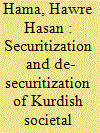

|
|
|
|
|
| Summary/Abstract |
The four countries hosting Kurdish populations in the Middle East have mainly been politically centralized in character and sought to follow a homogeneous nation-state model through the assimilation of their Kurdish communities. Drawing on the concepts of societal security, securitization, and de-securitization derived from the theories of the Copenhagen School, this article examines Kurdish (in)security in the Middle East and argues that the Kurds have experienced significant societal insecurity due to the adoption of assimilation strategies by their host states. I posit that federalism and power sharing are the two obvious de-securitization strategies that may address the securitization of Kurdish identity in the states with significant Kurdish populations. I further argue that, while the federal model has appeared to manage securitized Kurdish identity in Iraq since 2003, this solution may not be applicable to Turkey, Iran, and Syria. Alternatively, consociational power sharing as a form of institutional de-securitization carries the potential to address Kurdish identity in these countries.
|
|
|
|
|
|
|
|
|
|
|
|
|
|
|
|
|
|
|
|
|